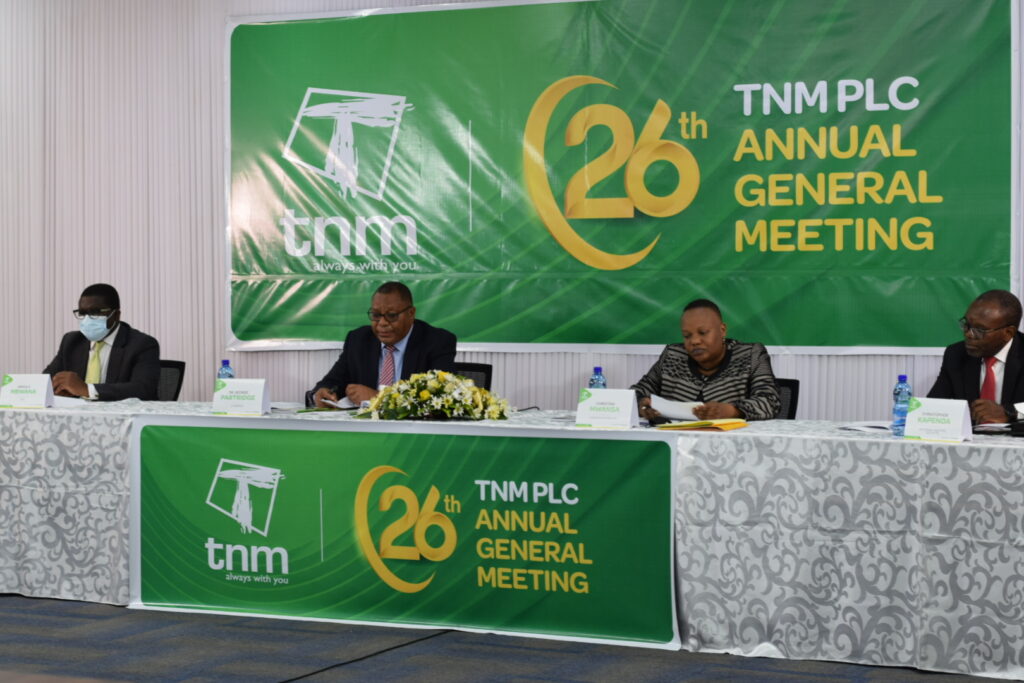
Malawi’s pioneer mobile and ICT services provider TNM plc invested over MK31.5 billion in infrastructure during the year 2020 as part of its ongoing effort of developing a sustainable business in line with the company’s vision to be aligned with the global trends in digital transformation.
Addressing a virtual Annual General Meeting (AGM) for TNM last week, TNM plc Board Chairman George Partridge said TNM plc will continue to transform its business by pioneering innovations that will transform the telecommunications sector in the country.
“Being pioneers of mobile telecommunications in this country since 1996, we take our role in innovations very seriously. I am glad to be part of this important phase of development in this industry that will contribute immensely to the development of individuals, businesses and the Malawi economy at large,” said Partridge.
He also told the shareholders of the company that in 2020, TNM created wealth amounting to MK53.3 billion.
“We shared MK36.9 billion to our stakeholders, with the greatest portion being MK10.6 billion given to the Government through levies and taxes. Our employees got MK9.9 billion of the value that TNM had created in the year,” said Partridge.
Partridge also told the shareholders that TNM’s Corporate Social Responsibility (CSR) focus areas continue to be in the areas of health, education and support for vulnerable groups saying the mobile company has contributed immensely through the traditional donations as well as providing connectivity to these important areas.
“TNM has contributed significantly towards the fight against the COVID-19 pandemic in Malawi especially in the education and health sectors. TNM provided ICT equipment and connectivity solutions to the education sector to allow for continued access to education when physical teaching and learning was not possible.”
“TNM also contributed over MK150 million to the health sector to allow them access personal protective equipment (PPE), allow health personnel in the four central hospitals in Blantyre, Lilongwe, Mzuzu and Zomba to access connectivity for health surveillance as well as support for COVID-19 related issues. Our company continues to sponsor the TNM Super League which contributes enormously to the development of the most popular sport in Malawi, football,” said Partridge.
He said they are looking ahead with great optimism and courage noting that the telecoms penetration in Malawi at 48% is still low compared to the regional markets where penetration is greater than 90%.
“The smartphone penetration is also very low but growing at a rate of more than 240% since 2018. We still have over 55% of Malawi’s adult population which does not have access to financial services of any kind. This means that the potential for growth of our business is still enormous. With investments that we are putting in infrastructure development and continuous improvement of our business, we expect successful years ahead,” he said.
In 2021, Partridge observed, the macro-economic environment is expected to remain challenging, putting pressure on service revenue and margins.
“The volatile exchange rates and foreign currency scarcity will continue to increase the cost of our operations. The adverse effects of the coronavirus pandemic that started in 2020 are expected to continue in 2021. However, the vaccination programs that have been rolled out are expected to provide a good base for economic activity and hence economic recovery”.
“We anticipate that there will be a surplus in the maize harvest, resulting in food security and providing our rural consumers surplus disposable income to spend on our services. We will continue to focus our attention on meeting and exceeding customer expectations by delivering outstanding customer experiences,” said Partridge.
Responding to a question from a shareholder on the declining of dividends that the company will declare to its shareholders, Partridge said the board was fully aware that the dividend growth between 2019 and 2020 declined and has been below inflation.
“The dividend growth dropped in real terms due to the decline in net profits available for distribution. The dividend policy of your company is to pay out between 40% – 60% of the distributable profits for that year.”
“The policy was framed that way to ensure that the company is able to invest in capital expenditure for future growth as well as it replaces old equipment and systems which may become obsolete due to advancement in technology,” said Partridge.

